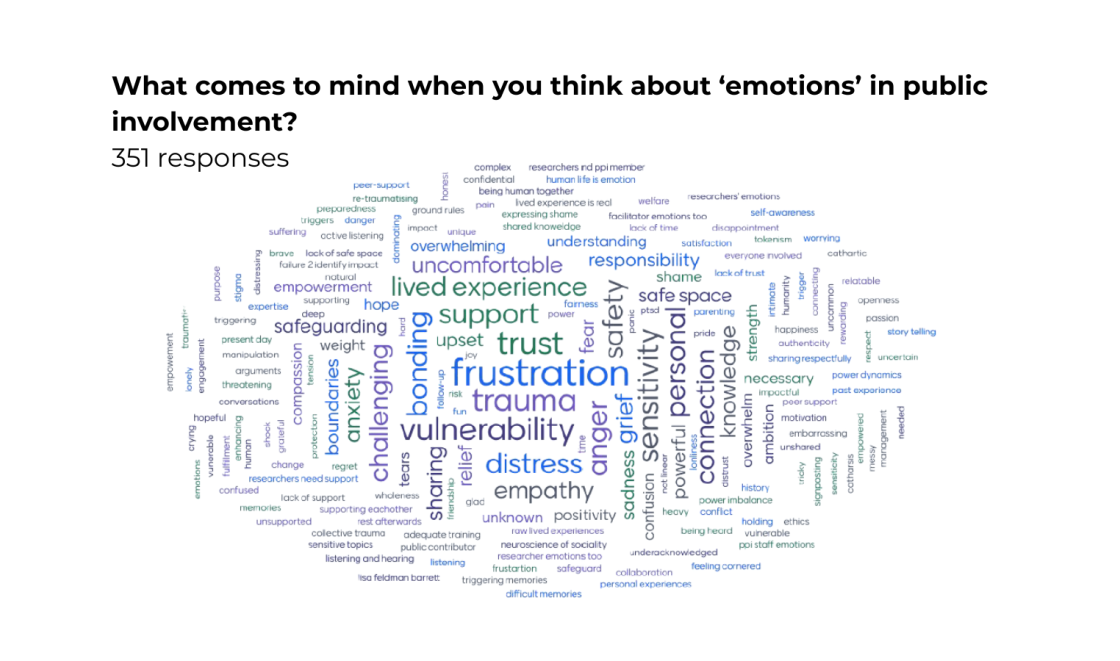Webinar explores the role of emotions in public involvement in research
Around 200 people participated in a national ARC webinar to explore the complex role emotions play in public involvement in health and care research on Wednesday 26 March.
Around 200 people participated in a national ARC webinar to explore the complex role emotions play in public involvement in health and care research on Wednesday 26 March.
The webinar was chaired by Stan Papoulias, public and patient involvement (PPI) research theme lead at NIHR ARC South London, and facilitated by Elspeth Mathie, theme lead of inclusive involvement in research at NIHR ARC East of England, and brought together the public, researchers and public involvement specialists, to discuss how emotions can shape research.
At the heart of public involvement is learning about people’s lived experiences, particularly of health conditions, services and experiences of care to inform research. Opening the webinar, Stan Papoulias said, “Inevitably, when we talk about lived experiences, we talk to a large degree about emotions, and this can bring up quite difficult and challenging topics, and we’ll be exploring this today.”

Recognising the importance and challenges of emotions in public involvement, researchers and public members from the PPIE team at NIHR ARC South West Peninsula worked together to produce a conceptual review on Emotion in public involvement. Three members of this team Lauren Asare, Naomi Morley and Julia Burton explored findings from the review in the webinar in an open discussion with the audience.
"The idea for the conceptual review came about after an experience of high emotions during a PPI meeting to identify priorities for research in care homes – a difficult and deeply personal subject," said Lauren Asare, graduate research assistant. “In that meeting, we found that emotions can strengthen the impact of what is said and bring people in the group together”. In their review the team identified 18 articles related to emotions in PPI. They complemented these with theoretical works on emotion from other disciplines including sociology, literature and art, and psychology.
Julia Burton a public contributor involved in the review, said that Wordsworth’s description of poetry as "the spontaneous overflow of powerful feelings: it takes its origin from emotion recollected in tranquillity" was highly relevant to emotions in public involvement.
The review identified recurring themes, including that emotion expressed in relation to the research topic can be both liberating and stressful, emotional work is part of PPI, and that the emotional aspect of lived experience needs to be recognised in how PPI is planned and facilitated.
We noted […] that sharing experiential knowledge can be cathartic and give people a sense of higher purpose as they use their own experiences to improve research and in turn, healthcare services. And this is particularly the case when researchers facilitate meetings in such a way that collaborators feel safe to share and assured that their input is valued
The speakers discussed practical strategies for managing emotional dynamics in involvement, including co-creating ground rules for group discussions, using traffic light systems to gauge emotional states and ensuring emotional safety for all participants, including researchers.
A key theme in the wider discussion was the importance of facilitation skills and training, helping those leading PPI meetings to manage emotional contributions appropriately. “Group facilitation and responding to individuals is an enormous skill – training really helps,” said one participant, Catherine Williams.
A well facilitated group can collectively manage the balance between emotional expression that facilitates the work, and emotional expression that needs to be listened to, validated, and then further support offered
Building on this theme, Naomi Morley, research associate at ARC South West Peninsula, emphasised the value of experiential knowledge for researchers, beyond formal training: "I think experiential knowledge as a researcher is so important […] things like volunteering and just being out there in the community […] I think a lot can be said for just learning, being with people."
In this context, Naomi Morley also discussed ongoing research on the complexities of PPI in sensitive areas of research, such as domestic abuse or the loss of a child.In areas like this, establishing mutual trust between researchers and involvement members is essential, but not straightforward.
Trust between researchers and public partners can be empowering […] but is also complex. Those that have experienced trauma have often had trust broken by somebody trusted to them
The webinar was part of a series of ARC national events on PPI research jointly organised with NIHR ARCs East of England, South London and South West Peninsula.